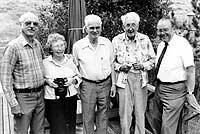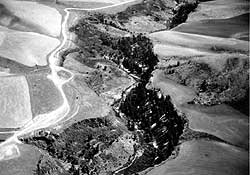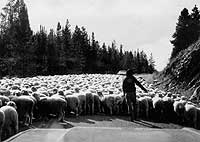|
Page
85
|




|
||
 |
||
| Photograph of L to R, Jack Rucker, Lois Kackley, Leigh Gittens,"Doc" Evan Kackley, Chilton Phoenix at the Kackley home, Old Williamsburg,(July, 1991) . | ||
 |
||
| Aerial view looking east, upstream in Blackfoot River Canyon west of Blackfoot Reservoir. The river occupies a narrow canyon cut in a Pleistocene lava flow which was erupted from the Blackfoot Lava Field. The lava flow filled the former river valley, (April, 1987). | ||
 |
||
| Sheep grazing was the largest cash agricultural crop in Idaho in the early 1900s. Photo taken near Wayan in July, 1978. | ||
 |
||
| Gravestone of Caribou Jack, Soda Springs Cemetery, (September,1995). |
Chinese Miners
Chinese
miners came to Carriboo in 1872 and were not excluded from the camp as they
were in other Idaho mining camps. They were most numerous about 1880, and were
generally acknowledged as being more skilled at mining than the Caucasians.
The Chinese miners fled Carriboo in 1885 after a number of Chinese massacres
in the west. In 1870 Chinese were the largest ethnic group in Idaho. Of the
4,269 Chinese, 3,853 were working as miners. That same year there were only
2,719 white miners in Idaho.
Freight
to Carriboo Mines
Until 1871,
freight traffic for the Carriboo mines came from Corinne, Utah,through Ross
Fork (Fort Hall) and north of Grays Lake along the McCoy Creek drainage. From
1877 to 1878, Oxford was the railroad stop nearest the mines and in 1878, a
stage road was established from Oxford through Soda Springs to the Carriboo
Mining Region.
In 1878, the U & N railway reached Oneida (arimo). In 1882 the first Oregon Short Line railway train passed through Soda Springs and the town became the major center to supply the Carriboo Mines.
Old
Williamsburg
Williamsburg,
now almost totally abandoned, had in the 1870s, three dairies,a boarding house,
saloon, school, post office and a summer tent city which included two prostitute
tents. Today it is the site of management of the Kackley Ranches.
Demise
of the Name Carriboo
In 1907, the
U.S. Forest Service created Caribou National Forest, changing the name from
Carriboo (or Cariboo) over the protests of the locals. The residents correctly
pointed out that no Caribou had ever lived in the area.The incorrect spelling
persists today, in the name of the National Forest and the County surrounding
Soda Springs.
Polygamists
in Star Valley Wyoming
Many of the
original settlers of Freedom, Wyoming were Mormon polygamists who refused to
give up their wives and families when Idaho and Utah enforced the Edmonds Anti-polygamy
act of 1882, but Wyoming refused to do so. The name Star Valley comes from Starvation
(Starve)Valley, a name the area gained during bitter winters in the late 1880s.Many
cattle were lost in the severe winter of 1889. There were over 40inches of snow
in two days and nights in March.
Cattle, Sheep, and Cranes
By 1875,
large cattle herds were grazed in the Grays Lake area or passed through the
area. Sheep became common in the 1890s. By 1894, 50,000 sheep summered north
of Soda Springs. By the early 1900s that number had increased to over a million.
Today much of the Grays Lake wetland area is part of a National Wildlife Refuge,
and provides nesting sites for Sandhill and Whooping Cranes.
References
Anonymous, 1976, Gold Mines of Cariboo Mountain, Idaho Yesterdays, v. 19no. 4, p. 10-15.
Carney, Ellen, 1992, The Oregon Trail: Ruts, Rogues, and Reminiscences: Wayan, Idaho, Traildust Publishing Co., 332 p.
Codman, John, reprinted 1976, A Trip to Cariboo Mountain: Idaho Yesterdays,v. 19, no. 4, p. 18-24.
Derig, Betty, 1972, Celestials in the Diggings: Idaho Yesterdays, v.16, no. 3, p. 2-23.
Fiesinger,D.W.,Perkins,W.D.and Puchy,B.J.,1982, Mineralogy and Petrology of Tertiary-Quaternary Volcanic Rocks in Caribou County, Idaho, in Bonnichsen, Bill, and Breckenridge, R.M., editors, Cenozoic Geology of Idaho: Idaho Bureau of Mines and Geology Bulletin 26, p. 465-488.
Johnson, Elaine S. and Carney, Ellen, The Mountain: Carriboo and other Gold Camps in Idaho, 1990, Maverick Publications, Inc. P.O. Box 5007, Bend Oregon, 97708, 245p.
Mabey, Don, 1979, The Bend of Bear River. Bountiful , Utah, Horizon Publishers and Distributors, 136 p.